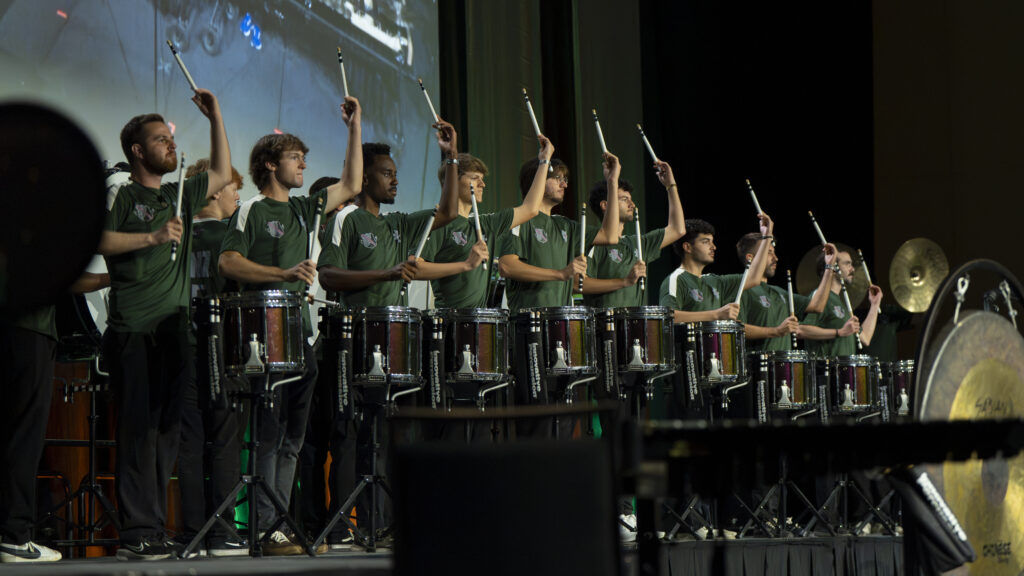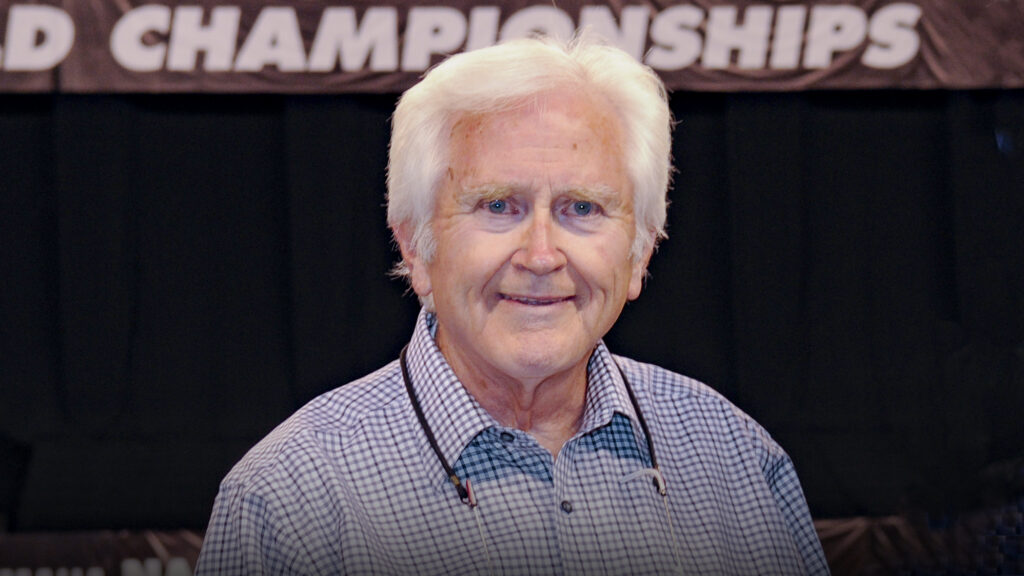Edward Escobar is an American who has been marching in a Japanese drum corps. In the following text, he enlightens us to the differences between the activity over there and over here. I am an active member in a drum and bugle corps in Saitama, Japan called the Sonic Lancers. This group is a part of the Kanto Region-based Drum Corps Japan (DCJ). What is intriguing to me is that I am the only non-Japanese member who has been participating in DCJ contests this past season, and one of only two (for what I am told) non-Japanese to ever participate in any DCJ contest during their 10-plus years of history. The other was Dave, a member of the Yokohama Inspires for three years; including the first year they performed at the DCA championships. Dave e-mailed me asking me what it was like to be the only gaikokujin “foreigner” in DCJ, to which I replied, “One of the best experiences of my marching career.” Honored? Never really thought about it. Bothered by it? Not really. Why should I be? Though I’m fairly quiet during rehearsals, I tend to take enjoyment in the attention I get, which in all honesty is not much outside my own corps. So many aspects of drum corps in Japan are the same as what we know and love in North America, but at the same time, so much is so completely different. For one thing, we perform indoors on a thirty-by-thirty meter floor, marked every five meters, instead of outdoors on a football field. Shows are shorter, (only eight minutes long, I think), and everyone speaks Japanese. Something interesting about DCJ, however, is that the announcement of the corps is done in English. Everyone wants the North American experience, and DCJ seems to be doing all they can to give it to them—including a season preview exhibition show in an athletic stadium—just so the corps here can feel what it is like to perform under the lights. Like most corps in North America, when you walk into a corps rehearsal, you are walking into a family. There are two married couples in the Sonic Lancers, one of which just got married last fall. I had the privilege of performing at their wedding as my very first performance as a Sonic Lancer. When I am shown wedding photos of members, both past and present, I have found that no album is complete without a photo of their drum corps companions, and no wedding is complete without a guest performance by the Sonic Lancers. What a wonderful feeling it is to spend every weekend with such a wonderful group of people, and they are letting me be a part of this. Many corps folks in North America have never experienced the activity outside their own territory. Those who were a part of Blue Devils or the Cavaliers when they performed in Japan were, in my opinion, given a possible once-in-a-lifetime opportunity to see what drum corps is like outside Drum Corps International competition. And DCJ isn’t the only organization that administers drum corps competitions. The Japan Marching Band and Baton Twirling Association and Marching in Okayama also provide competing opportunities for the corps here. Though the activity itself here in Japan is small, it is quite mighty, and the groups here know how to put on a good show. How did I end up in Japan? In 1999, I was a part of Bands of America’s Honor Band that did a two-week tour of Japan over the summer. The short side of the story is that I wanted to work as an English teacher in Japan after I graduated from college, and the job that I was offered put me in Saitama. After realizing how much time I had over the weekends, I went online and starting looking to see what drum corps were active around me and came across the Sonic Lancers Web site. I spoke with the current drum major via e-mail, and at first he was very hesitant about me wanting to join, telling me things along the line of, “we’re not as good as American drum corps,” or, “we’re very small and not as competitive as other corps.” But, he let me come to the rehearsals, and within a month I was on the roster. Other than myself, there is only one other member of the Sonic Lancers who has participated in a DCI drum corps. He is our horn line captain, who marched with Blue Stars in 2000. Our marching technique, brass warm-ups, etc. are all from the 2000 Blue Stars, which is ironic, I think. When I was marching with Yamato, I considered Blue Stars to be our rivals, (jokingly of course), and now here I am playing along side a former Blue Star and playing their warm-ups. Other members of the corps had gone with the Yokohama Inspires to the DCA championships a few years back, but I don’t think there is anyone who has gone to the DCI championships as a spectator. However, most are proud owners of a number of DCI CDs, DVDs and apparel. One of our percussionists was recently showing us the DVDs he had just purchased, which included the Cadets of the 1980s, the Cadets of the 1990s, the Cadets percussion DVD, “Blue Devils Through the Years—1980s” and “Blue Devils Through the Years—1990s.” DCJ’s Autumn Preview Exhibition show that I mentioned earlier is the only opportunity for corps here to perform outside and under the lights. In the speech that a few of the corps captains gave, they expressed how big of an opportunity this was, that they could perform like the American corps. DCJ also has arranged a piece of music that we use at retreats, similar to “America/O Canada.” What we use is “Let It Be Me.” When I was introduced to it, I was told to think about the 1978 Spirit of Atlanta arrangement. Another interesting note about DCJ is the English announcement of the corps. For the corps to hear, “Sonic Lancers, you may now take the floor for competition” is amazing. They go nuts hearing it, and it seems to bring up the level of pride in each individual upon hearing this. For foreigners, I would say being indoors is what sets Japanese drum corps apart from American corps. Rehearsals are year-round, but usually only on weekends and holidays (much like a DCA corps or a regional Division II & III corps). We are all-age, with our youngest member being 15 and our oldest somewhere in his 40s, which sets the stage for the senpai/kohai (senior/junior) system as far as who has the leadership roles. But truth be told, the difference between corps here and corps in North America is not all that different. Instead of having a tour fee, we have a monthly fee. We’re not a nonprofit group by any means. We’re more of a community club. However, there is one corps that is sponsored by a high school (Phoenix Regiment) and another sponsored by a university (Pride of Soka). Each corps has an official jacket that members use to show off their patches. There are no charter buses. We pretty much gather all our stuff and pile into trains for show days. Every corps has an equipment truck. I don’t think anyone has anything like a corps hall. 2006 DCJ Championships On Saturday, Jan. 28, the Sonic Lancers, as well as the other drum and bugle corps in DCJ, put on their best show of the season. There wasn’t anything near 40,000 fans, nor was it hosted in a professional sports stadium, but it was one of the biggest events of the year for the corps fanatics in the Kanto Region; including myself. All judges were from DCI. I didn’t get to run into any of them, but I did run into two other folks during the event. One was a guy by the name of Gus, a member of the Caballeros Alumni corps, who had came to Japan just to see the championships. The other person I ran into was writing and taking photos for Drum Corps World, Robert Lancy. I thought it was funny how he ran into me. The Sonic Lancers were on their way to rehearse the retreat. Out from the hallway I hear, “Hey, are you American?” I didn’t get to talk to him much there because I was on my way to a rehearsal, but during intermission, I found him in the lobby and we began talking. The event itself was very different from a drum corps show in North America, yet there are things that DCJ does to try and make it as “North American” as possible. A corps being given the opportunity to rehearse on the competitive field/floor prior to the contest is new to me. Every corps was given 30 minutes of rehearsal time prior to the start of the event. After all this was done, the corps came together and rehearsed the Grand Finale full corps retreat (something that never happens in the states) to the retreat music of “Let It Be Me.” At the actual retreat, once the corps were dismissed, each corps played themselves off, with drum majors saluting the winning corps as they marched off to a cadence—something not seen in contests in North America anymore—that I am aware of. The crowd was interesting, to say the least. It’s like they want to be a drum corps crowd, but don’t know how. There are a few who will yell and shout out phrases to the corps, and they will cheer as loud as they possibly can for their favorite corps, but the majority still haven’t gotten past the polite golf clap. The placements were as follows: Division I: 1st-The Yokohama Scouts, 2nd -Yokohama Inspires, 3rd-Tokyo Phoenix, 4th-Phoenix Regiment. Division II; 1st, Imperial Sound 2nd, Cherry Blossom, 3rd-Sonic Lancers. High Percussion-Tokyo Phoenix, High Brass-Yokohama Inspires, High Color Guard-Cherry Blossoms. Both division champions and runner-ups were awarded trophies (but not medals) and a champion flag went to the first place corps, as well as gifts (such as a new snare drum from Pearl) from sponsored companies. We also received patches with the wording “2006 DCJ Championship” on them. Drum Corps Japan (DCJ) and the Japan Marching Band & Baton Twirling Association (JMBA) are separate organizations. JMBA is the one with the high schools, elementary schools, and pretty much anyone who has a marching band. DCJ is the G bugle-only group. Wayne Downey works with a group named the SOKA Renaissance Vanguard. They had won the all-Japan Nationals (JMBA) the last three years in a row, so this year they were the exhibition group. Renaissance Vanguard had also won every DCJ contest until they switched instrumentation to B-flat horns, causing them to exit DCJ after the 2000 season. But DCJ did allow Renaissance Vanguard to perform in exhibition at the DCJ Hachioji Open last December. I guess one could assume that with only seven units taking part in the championships, if DCJ loses more corps to the instrumentation switch (following the lead of Renaissance Vanguard and American corps), that they might have to consider opening the organization up to any-key brass, but I don’t know enough about DCJ to know for sure. It doesn’t seem likely that any of the corps currently participating will switch anytime soon, either due to a lack in funds (corporate sponsorships are rare it seems, with only a few groups actually having someone) or lack of interest. The corps competing now have been competing in DCJ since the doors opened about 10 years ago. Like DCI, the organization belongs to the corps who compete in it.
Michael Boo has been involved with drum and bugle corps since 1975, when he marched his first of three seasons with the Cavaliers.
He has a bachelor’s degree in music education and a master’s degree in music theory and composition.
He has written about the drum corps activity for over a quarter century for publications such as Drum Corps World, and presently is involved in a variety of projects for Drum Corps International, including souvenir program books, CD liner notes, DCI Update and Web articles, and other endeavors. Michael currently writes music for a variety of idioms, is a church handbell and vocal choir director, an assistant director of a community band, and a licensed Realtor in the state of Indiana. His other writing projects are for numerous publications, and he has published an honors-winning book on the history of figure skating. His hobbies include TaeKwonDo and hiking the Indiana Dunes. But more than anything, Michael is proud to love drum corps and to be a part of the activity in some small way, chronicling various facets of each season for the enjoyment of others.





